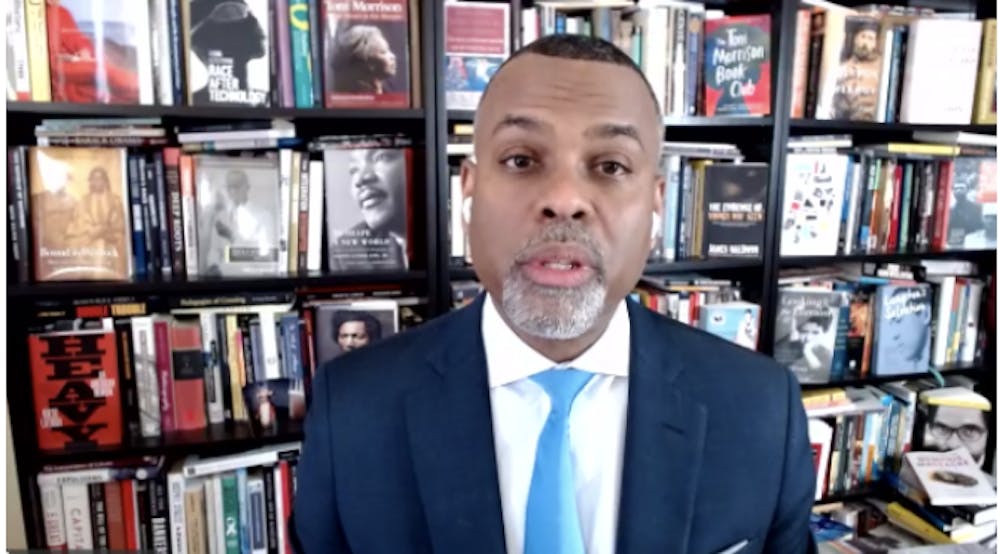By Kevin Hornibrook
Correspondent
The College was virtually visited by Dr. Eddie Glaude on Feb. 26 for a presentation on Black history, social justice and the future of America. The Inclusive Excellence Team hosted the event.
Glaude is a published author and contributor to Time magazine and various MSNBC shows such as “Deadline” and “Morning Joe,” in addition to being chair of the African American Studies Department at Princeton University.
“Dr. Glaude is one of the preeminent African American intellectuals who speaks to the complex dynamics of the American experience,” said Kerri Tillett, Associate Vice President for Diversity and Inclusion. “Given the current political climate and the difficulties of race in the United States, he seemed the natural choice for the 2021 programming calendar for Black History Month. It also does not hurt that his wife [Dr. Winnifred Brown-Glaude] is one of our own: a professor of African American studies and sociology at TCNJ.”
This was the final event planned for Black History Month at the College, but education on Black history is not limited to a month — it is year-round.
“Black History Month isn’t simply about a detailed listing of Black excellence or examples of Black achievement,” Glaude said. “Of course it can be that, but it is also an occasion to look at the deep contradiction that rests at the heart of the country: one rooted in the idea that white people ought to matter more than others.”

This idea is one that he believes is still very present in American society and politics, citing the circumstances of and leading up to the Jan. 6 riots at the Capitol.
“The American idea is in trouble,” Glaude said. “Today we confront the ugliness of who we are, and that ugliness isn't just about who occupies the White House or murderous police officers or loud racists screaming horrible things. If it involves in part the millions of Americans who feel the country has turned its back on them, who feel the browning of America represents a distinct decline.”
This idea resonated with Tillett, who felt that emphasizing the courage needed to “confront the ugliness of who we are” was the most important part of Glaude’s entire lecture.
He explained that this racial worry stems from what he referred to as a refusal by some Americans to “grow up,” or to leave racist history behind them and embrace progress. As an example, he mentioned that following the assassination of Dr. Martin Luther King, America elected Richard Nixon rather than embrace King’s legacy. He tied America’s election of Ronald Reagan and Donald Trump to the same point.
“Without a hint of irony at CPAC right today, (Trump supporters are) pushing a golden statue around like the golden calf — a golden statue of Donald Trump,” Glaude said. “It feels like a suppressed terror and panic lurks...that the seams are unraveling and revealing the true monstrosity behind the cheap-ass MAGA hat and T-shirt.”
Even with his condemnation of Donald Trump’s presidency, he was clear in stating that he is not satisfied with only voting him out of office.
“We know that the election in November didn't settle any of this,” he said. “I pray we do not trade one fantasy for another, that somehow the election affirms America’s inherent goodness and puts the country back to sleep.”
Much of Glaude’s presentation contained recitations of Black history and readings from influential leaders, namely James Baldwin. In connecting this history to modern progress, he made a call for drastic and “bold” change, or a “moonshot.”
“‘Not everything that is faced can be changed but nothing can be changed until it is faced,’” Glaue said quoting James Baldwin. “Such powerful words for this country today, and for us. We cannot stick our heads in the sand this time. We cannot tinker around the edges this time. What will be your moonshot TCNJ?”
Tillett said the College is, like other institutions, trying to make room for these progressive leaps by making the campus a safe and open space.
“We are all trying to ensure that our campuses are welcoming to the wide diversity of students who will call TCNJ home,” she said.
“We need to build a college that actually looks like the world which we exist in. What might that commitment entail?” Glaude asked during the closing portion of his lecture.
The seminar opened to attendees for a Q&A after his conclusion.
When tasked to explain about his personal motivations to pursue equality, he equated himself to a pianist trying to learn a piano rendition of the late saxophonist John Coltrane’s “Giant Steps,” someone who has a lot to get done but is determined to accomplish it.
“I tell myself this all the time just as I tell young people this all the time,” Glaude said. “The world tries to make you small, the question is will you let it? Take giant steps.”







